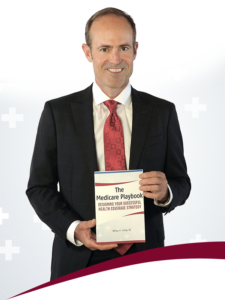| February 2022 | MediGap Advisors Health & Wealth Newsletter | Vol. 18, Issue 2 |
February is National Cancer Prevention Month – Here Are Some Simple Steps to Lower Your Risk
It’s February, which means that it’s National Cherry Month, National Sweet Potato Month, and National Fondue Month, among many others.
But it’s also National Cancer Prevention Month, and as a Medicare Enrollee, this one might be the most important, if not a little less appetizing. As the leading cause of death worldwide, it’s important to call attention to this potentially devastating condition. That’s why we’re using this month’s newsletter to share some simple ways to decrease your risk and stay protected.
5 Ways to Lower Your Cancer Risk in 2022 and Beyond
1.) Use Your Annual Medicare Cancer Screenings
It’s estimated that 1 in 4 cancer cases could have been avoided or greatly mitigated with regular screenings.
As a Medicare enrollee, you are guaranteed access to a number of regular cancer screenings, some without a copay.
Here’s a rundown of the Medicare Coverage for Cancer Prevention and Detection:
- Mammograms: One screening every 12 months. No charge as long as the provider accepts the Medicare charges. If your doctor orders diagnostic mammograms more frequently, they can also be covered by Part B.
- Cervical Cancer: One Pap test and pelvic exam every 24 months, or every 12 months if you are at high risk or have had an abnormal Pap test within the past 36 months
- Colorectal Cancer Screening: One fecal occult blood test every 12 months, and one multi-target stool DNA test every 3 years.
- Screening Colonoscopy: One screening every 24 months if you’re at high risk, or every 4 or 6 years if your previous colonoscopy was normal.
- Lung Cancer Screening: Once per year if you have been a regular smoker within the last 15 years, or if ordered by a doctor
- Prostate Cancer Screening: Once every 12 months for men over 50
2.) If You Smoke, Use Medicare’s Smoking Cessation Counseling
Your Medicare Part B covers as many as 8 smoking cessation counseling visits. If you want over-the-counter tobacco cessation products like nicotine gum or patches, make sure that your Part D plan includes coverage for them (not all of them do).
3.) Learn About Your Personal Cancer Risk Factors
We all come from different genetic backgrounds, and we live vastly different lifestyles. Your personal risk for developing one type of cancer or another will depend on a lot of specific factors.
The most common risk factors for cancer include:
- Old age
- A family history of cancer
- Tobacco use
- Obesity
- Alcohol use
- Certain viral infections like HPV
- Exposure to certain chemicals or radiation
- Excessive exposure to ultraviolet radiation from the sun
If you want to dive deeper, there’s a good write-up for assessing your personal cancer risk at Cancer.Net.
4.) Exercise Regularly
There is an overwhelming amount of research that links physical activity to a lower risk of cancer. This goes for many common types of cancer, including breast, prostate, and colon. At the same time, that same physical activity will reduce your risk of heart disease and diabetes.
It’s recommended that Medicare-aged adults should get at least 150 minutes of moderate-intensity exercise every week. That’s only about 21 minutes of brisk walking per day!
5.) Take Control of Your Diet
The American Cancer Society has published numerous studies linking certain foods to lower cancer risk. At the same time, consumption of red meat and certain processed foods has been linked with an increased risk.
Here are some base-level suggestions to keep your risk as low as possible:
- Aim for 2 ½ cups of fresh fruits and vegetables per day
- Take it easy on the red meat intake, and processed meats like bacon, sausage, and hot dogs
- Choose whole grains over refined grains, and brown rice over white rice
- Cut back on your processed sugar intake
Your Personal Health is the Most Important Thing; We’re Here to Help
The MedGap Advisors credo is to save people as much money on healthcare as possible, so they can enjoy their lives to the absolute fullest. The absolute easiest way to save big is to keep yourself healthy, and avoid known risks.
If you’re worried about whether your Medicare coverage is adequate, we’re always here to help. Free Medicare consultations are available year-round, and the MediGap Advisors Blog is full of tutorials and managing both your physical and financial wellness.
To your health and wealth,


Wiley P. Long, III
President – MediGap Advisors

